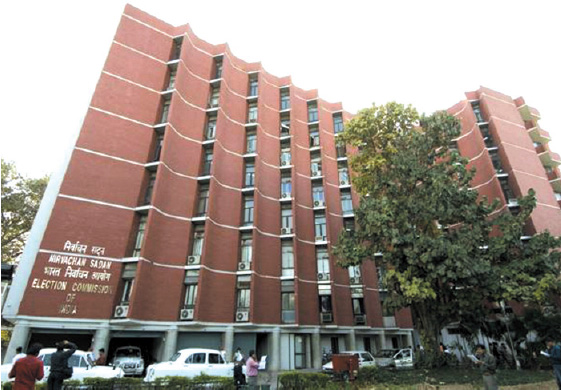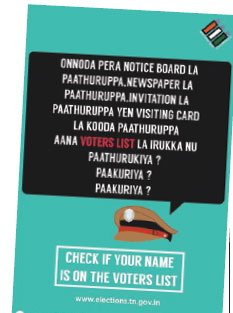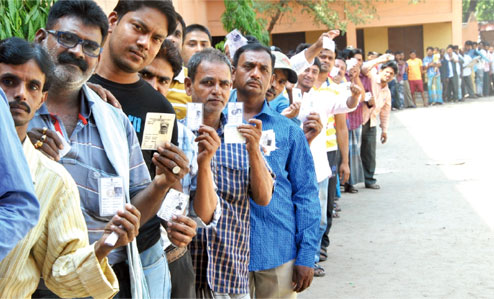PRIME Minister Narendra Modi prostrates before Delhi’s Parliament House, venerating it as ‘Temple of Democracy’. At Capitol Hill in Washington DC, he uses the same superlative for the US Congress: “This temple of democracy has encouraged and empowered other democracies the world over… It manifests the spirit of this great nation… In granting me this opportunity, you have honoured the world’s largest democracy and its 1.25 billion people… As a representative of world’s largest democracy, it is indeed a privilege to speak to the leaders of its oldest.”
On June 26, the 41st anniversary of Emergency, PM Modi said this in his Mann ki Baat: “The night of June 25-26, 1975, was the darkest night for democracy. All rights of citizens were taken away, country was turned into jail. Many political leaders like Jayaprakash Narayan were put behind bars… we are now in a democracy. Democracy is our strength.” These comments are eulogising India’s democracy. Has he ever bothered to look at its underbelly? If he had done so, he would have found it rusted, moth-eaten and crumbling, not something to be hyped about.
Country’s trackrecord of timely and efficient elections has given considerable prestige and legitimacy to India’s democratic polity and its politicians who are the beneficiaries. But the moot question is what kind of people get elected? Are they ‘leaders’ or ‘dealers’? Nearly a third of elected representatives face serious criminal charges such as murder, rape, abduction and offences relating to moral turpitude. Almost all of them have amassed wealth much beyond their known sources of income!
Successive governments did not lift a finger to set right things. However, the Supreme Court intervened and in its judgment in March 2003, directed all candidates contesting elections to file affidavits before the Returning Officers stating their criminal antecedents, assets and liabilities. This was meant to curtail criminal and money-power in elections. The same court on July 9, 2013, struck down Section 8 (4) in the Representation of People’s Act (RP Act) allowing MPs and MLAs to continue to be elected representatives even after they get convicted for criminal offences. On July 5, 2013, the apex court decreed that ‘Freebies shake the root of free and fair elections to a large degree’ and directed the Election Commission (EC) to frame guidelines for election manifesto.
Nearly a third of elected representatives face serious criminal charges such as murder, rape, abduction and offences relating to moral turpitude. Almost all of them have amassed wealth much beyond their known sources of income!
But all these have come to naught and the rot is deepening. We saw this glaringly in Tamil Nadu Election in 2016 where money power and freebies were in full flow. The role of money power is described by the EC in its order rescinding election in Aravakurichi and Thanjavur assembly constituencies: “Decision is based on the Commission’s assessment about the vitiated atmosphere in the constituencies created by the illegal use of money power to allure the electorate by unethical and unlawful means resorted to by the candidates and the parties.” The word ‘vitiated’ appears at several places in the Order. What was written of these two constituencies was applicable mutatis mutandis to almost the entire State!
EC’s Model Code of Conduct, 2014, (MCC) on freebies directs political parties and candidates to “avoid making those promises which are likely to vitiate the purity of the election process or exert undue influence on the voters in exercising their franchise”. Also, in the interest of transparency, level-playing field and credibility of promises, manifestos should “reflect the rationale for the promises and broadly indicate the ways and means to meet the financial requirements for it”.
Election Manifesto released by the AIADMK Party on May 5, 2016, just 10 days before the polling date, was in total violation of the Supreme Court judgment and the MCC. Earlier, the DMK had issued its manifesto with some freebies. EC did not take any action on these blatant violations except issuing a belated and weak notice to these parties, that too on the representation from civil society. No further action was taken, polling proceeded and government was installed in power. Post-poll surveys clearly revealed that the massive freebies offered in the manifesto were the clincher.
ADDED to these was the serious matter of seizure of huge cash of `570 crore at Tiruppur, just two days before election (around midnight of May 13-14, 2016) that had raised suspicion of humungous electoral bribing. The totally unbelievable story of this money (supposed to belong to SBI), moving from Coimbatore to Vizag, is yet to be fully investigated. On the orders of the Madras High Court, the CBI is looking into it. But, since this happened in an election-bound State under the virtual administration of EC, it is their responsibility to ascertain facts and initiate stringent action.
Why the rot?
Major factor is the attitude and approach of political parties who are a law unto themselves. These entities have failed to bring about inner party democracy, transparent funding and functioning as well as merit-based selection of candidates free of criminal and corruption taint. The Political Parties (Registration and Regulation of Affairs) Bill, 2011 drafted by the Association for Democratic Reforms is in cold storage. What is worse, political parties do not even want to be considered as ‘public authorities’ and have willfully defied the RTI Act. They liberally field criminals and corrupt as candidates seeking election. They indulge in electoral corruption of alarming proportion that includes individual bribing and vote-buying as well as mass inducement through lavish showering of fancy/consumer goods as freebies in the election manifesto. All these have made the electoral field an uneven cesspool.
Being controlled by these very political parties, the central government is averse to any change. Proposals from the EC are pending for decades. Though all kind of reforms are being brandished to make India a super-rich and super-clean country, there is not even a whisper about electoral reforms to clean-up and enrich India’s democracy which is our greatest asset. Most glaring instance is rendering the SC mandate of filing of affidavit by the candidates into a damp squib because the government has failed to amend rules to disqualify corrupt and criminal elements at the thresh-hold. Political parties continue to field these politicians who become MPs/MLAs even after filing false affidavits about their criminal record and illegal wealth! And most of them get elected!
Though all kind of reforms are being brandished to make India a super-rich and super-clean country, there is not even a whisper about electoral reforms to clean-up and enrich India’s democracy which is our greatest asset
THE constitutional mandate and Supreme Court judgments hold EC squarely responsible for conducting fair and free elections, which is a basic feature of the Constitution. For this, EC is vested with legal (RP Act) and plenary powers (Article 324 of the Constitution). Yet, EC is finding itself between a rock (political parties) and a hard place (government). For instance, though Section 58A of RP Act empowers EC to countermand election for ‘booth capturing’, it has not been extended to ‘vote capturing’ through bribes and freebies. Bullied by political parties and disheartened by the government’s indifference, EC has compromised on electoral integrity. Result is the sharp diminishing of India’s democracy. However, in TN Election, 2016, exercising plenary powers, EC rescinded elections in two constituencies due to widespread bribing of voters. It also issued notices to the two major political parties on the lavish promises of freebies in their election manifestoes. One has to be thankful for small mercies.

Issues & Posers
We need to look at India post liberalisation, privatisation and globalisation regime starting from early nineties. No doubt, the country has made great strides in many fields and is now being heralded as world’s fastest growing economy. Twenty-five years down the line, we are in the grip of a market economy. Rich have become richer, black economy has boomed and there is extreme poverty and inequity.
In these years, election technology and management has advanced with EVMs, IT solutions and vast array of observers, surveillance/ raiding teams and paramilitary forces. But democracy has decayed. Among the three players in the election field, rule-less political parties are going from strength to strength, rule-bound government is indifferent and EC is paralysed. Another key and powerful player, judiciary, is treating election in a casual manner and would not decide election-petitions for ages, making it a mockery.
In all, it turns out that election is a mere exercise to facilitate political parties to capture and retain power by fair or foul means. Fundamental principles of democracy, such as electoral integrity and level playing field, do not seem to have much space in the scheme of things.
We are seeing this happening right before our eyes. In TN, politicians bought peoples’ votes and became MLAs. In many other States, MLAs sold their votes to money-bags to make them MPs (Rajya Sabha). Lok Sabha election is no better. Grassroots elections (panchayats and urban local bodies) are even worse. India’s ingenuity for jugad has morphed world’s largest democracy into world’s biggest satta bazar!
What needs to be done?
Post-TN Assembly and Rajya Sabha elections, a round table of eminent activists, senior politicians and civil society leaders along with representatives from the EC threw up some very practical and pragmatic solutions to stem the rot engulfing the country:
- Selection process of candidates by political parties to contest elections should undergo a paradigm change. India needs a system wherein people can select and elect their representatives who can be recalled if they don’t perform or indulge in corrupt practices.
- We need to develop mechanisms at the level of the constituencies where an elected constituency committee will involve the electorate in the process of selection of candidates. In open meetings of this committee, merits of potential candidates should be discussed and selection made. These selected candidates will be known and trusted by the people.
- As of now, electoral arena is totally biased in favour of established parties that have a permanent symbol that can be easily recognised by the voters. Since this is not available to smaller parties who want to enter the fray to provide alternatives, they are put at tremendous disadvantage. Either all registered parties should be assigned permanent symbols or none. Every party should get different symbol for different election. This could usher in a level-playing field, which is the biggest bugbear in today’s elections.
- Announcing mind-boggling freebies in the election manifestos in violation of MCC should be an electoral offence punishable with de-recognition and disqualification of the concerned political party from contesting elections.
- Corporate funding should be banned since it brings undue influence of money power. This was done for a brief period in the late 1970s. It was again permitted under the plea that they have as much right to fund elections. This ban should be brought back.
- A judicious mix of the existing first-past-the-post system and a list-based proportional repre-sentation system would be good for India.
- To prevent criminals from getting elected, MCC must demarcate political activists from criminals. For this purpose, Section 8 of the RP Act needs to be amended. It may not be foolproof but at least there can be a check.
- The appointment of Election Commissioners should be by a collegium rather than being left to the whims of the government of the day.
- When a new political party wants to work for the country, they should get the opportunity to reach out to the electorate through the media, which is now being controlled by big corporate houses and political parties. It is they who decide the winner through opinion polls and creating “waves” about a particular party or messiahs. EC should ensure equal access to media for all players.
- Party politics has drowned good governance. EC has the power for about two months to control the parties. EC should have power throughout and not just at the time of elections.
- People may be accepting cash-for-votes since they know that they will not get anything after the elections. So they take whatever is given before the elections. Political parties are reportedly funded by mafia and it is their money which is used to bribe the voters. EC should take action to stem this before, during and after the elections.
- Mafia money used for bribing voters is accumulated and stacked over a period of time and it is not possible for EC to unearth it in a time-period of two months. This is the responsibility of the Income-Tax department and Enforcement Directorate. EC should evolve a mechanism to involve these agencies over longer period instead of doing fire-fighting at the nick of time.
- There is need for an all-India non-government body, whose main objective would be to oversee the process of political integrity. This body should go into the whole issue of political funding. It can check the character and experience of the proposed candidates and can keep a watch on the entitlements of elected representatives. This body can work with EC to bring about political and electoral integrity.
- People are ignorant about the basic tenets of democracy and the purpose of holding periodic elections. They think it is just about political parties capturing power. Massive education and awareness building is required to undo this. Democracy and electoral process should be made part of the school and college syllabus in all streams of studies.
 Election Commission as the Catalyst
Election Commission as the Catalyst
Consensus is that due to near-total lack of electoral integrity, India’s democracy is facing serious decay. Neither political parties nor governments are willing to take the necessary remedial steps to pull democracy out of this morass by ensuring stringent standards of electoral integrity.
But all hope is not lost because “We, the people, who gave ourselves the Constitution” have not given this responsibility to the government or political parties, but to the EC. People have also bestowed EC with legal and plenipotentiary powers. In a catena of judgments, the Supreme Court has further strengthened it by ruling that “conducting free and fair elections is the basic feature of the Constitution” and this is the responsibility of EC. It is, therefore, imperative on the part of EC to function as a catalyst to rally the forces and ensure electoral integrity by all means and not remain tied to the apron strings of the government.
 AS of now, EC does not consult the people, the sovereign and the real stakeholders who give power to the politicians. Instead they pander to political parties, who are only interested in grabbing power by fair or foul means. EC is not placed there by “We, the People” to bring political parties to power and allow them to do whatever they want. EC is there on behalf of the people to sustain democracy and make it vibrant. So, EC must initiate a country-wide discourse wherein people across-the-board should be involved. Civil society organisations, that include everyone except those governed my military laws, can assist the EC in this task.
AS of now, EC does not consult the people, the sovereign and the real stakeholders who give power to the politicians. Instead they pander to political parties, who are only interested in grabbing power by fair or foul means. EC is not placed there by “We, the People” to bring political parties to power and allow them to do whatever they want. EC is there on behalf of the people to sustain democracy and make it vibrant. So, EC must initiate a country-wide discourse wherein people across-the-board should be involved. Civil society organisations, that include everyone except those governed my military laws, can assist the EC in this task.
EC is not a subordinate entity of the government. It represents “We, the people” to ensure electoral integrity. In that capacity, EC should seek a fresh RP Act, incorporating all the above suggestions as well as the provisions of the draft Political Parties Bill, 2011. Sooner this is done the better it is for India’s democracy!
The writer is a former Army and IAS officer. Email: deva1940@gmail.com
IAS (retd) with a distinguished career of 40 years - worked in Army, Govt, Private, Politics & NGOs.












































